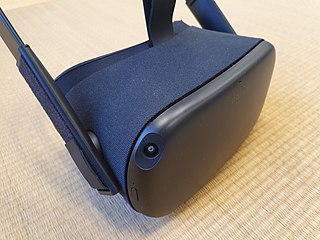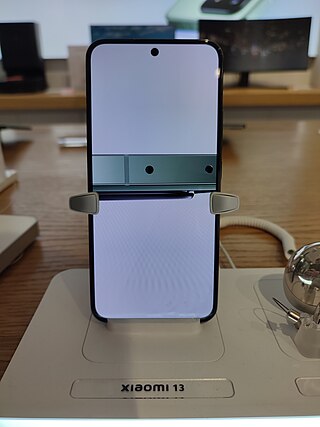The Global Mobile Internet Conference is hosted annually in Beijing and Silicon Valley. Mobile executives, entrepreneurs, developers, and investors from around the globe and across platforms attend GMIC each year.

Xiaomi Corporation, commonly known as Xiaomi and registered as Xiaomi Inc., is a Chinese designer and manufacturer of consumer electronics and related software, home appliances, automobiles and household hardware. It is the second-largest manufacturer of smartphones in the world, behind Samsung, most of which run on the MIUI operating system, which is based on the Android operating system. The company is ranked 338th and is the youngest company on the Fortune Global 500.

Sketchfab is a 3D modeling platform website to publish, share, discover, buy and sell 3D, VR and AR content. It provides a viewer based on the WebGL and WebXR technologies that allows users to display 3D models on the web, to be viewed on any mobile browser, desktop browser or Virtual Reality headset.

Reality Labs, originally Oculus VR, is a business and research unit of Meta Platforms that produces virtual reality (VR) and augmented reality (AR) hardware and software, including virtual reality headsets such as Quest, and online platforms such as Horizon Worlds. In June 2022, several artificial intelligence (AI) initiatives that were previously a part of Meta AI were transitioned to Reality Labs. This also includes Meta's fundamental AI Research laboratory FAIR which is now part of the Reality Labs - Research (RLR) division.

Redmi is a subsidiary company owned by the Chinese electronics company Xiaomi. It was first announced in July 2013 as a budget smartphone line, and became a separate sub-brand of Xiaomi in 2019 with entry-level and mid-range devices, while Xiaomi itself produces upper-range and flagship Xiaomi phones.

The Xiaomi Redmi 1 is a smartphone released in July 2013 in China And August 2013 in Global, developed by the Chinese smartphone company Xiaomi Inc. It is the first product of the Redmi series of smartphones. It came with a 4.7-inch 720x1080 IPS screen, a MediaTek MT6589T Quad-core 1.5 GHz Cortex-A7 processor and originally run Android 4.2.2 Jellybean with the MIUI v5 user interface, upgradeable to Android 4.4.2 Kitkat with the MIUI 9 user interface.

The Xiaomi Redmi Note 3 is a smartphone developed by Xiaomi Inc. as part of Xiaomi's low-end Redmi smartphone line. It has three variants:

A virtual reality headset is a head-mounted device that provides a virtual reality environment for the wearer. VR headsets are widely used with VR video games but they are also used in other applications, including simulators and trainers. VR headsets typically include a stereoscopic display, stereo sound, and sensors like accelerometers and gyroscopes for tracking the pose of the user's head to match the orientation of the virtual camera with the user's eye positions in the real world.

Daydream is a discontinued virtual reality (VR) platform which was developed by Google, primarily for use with a headset into which a smartphone is inserted. It is available for select phones running the Android mobile operating system that meet the platform's software and hardware requirements. Daydream was announced at the Google I/O developer conference in May 2016, and the first headset, the Daydream View, was released on November 10, 2016. To use the platform, users place their phone into the back of a headset, run Daydream-compatible mobile apps, and view content through the viewer's lenses.

The Xiaomi Redmi Note 4 is the fourth smartphone under the Redmi Note series developed by Xiaomi Inc. It is a part of Xiaomi's budget Redmi smartphone lineup. It has two variants : The older version sold as Redmi Note 4 is powered by a Deca-core Mediatek MT6797 Helio X20 SOC. The upgraded version, sold both as Redmi Note 4X and Redmi Note 4 is powered by an Octa-core MSM8953 Qualcomm Snapdragon 625 SoC. The Redmi Note 4 was succeeded by Redmi Note 5.

Xiaomi Redmi Note 5 is a smartphone developed by Xiaomi Inc. It is a part of Xiaomi's budget Redmi Note smartphone line. Redmi Note 5 was announced on 14 February 2018 in Delhi, India, alongside the local release of the Redmi Note 5 Pro.
Xiaomi Smart Home Products are products released by third-party manufacturers who have partnered with Xiaomi. These products are managed by Xiaomi Home app.

The Oculus Go is a standalone virtual reality headset developed by Meta Reality Labs in partnership with Qualcomm and Xiaomi. It is in the first generation of Facebook Technologies' virtual reality headsets, and the company's first device in the category of standalone VR headsets, which was a new category at the time of the Go's release. The Oculus Go was unveiled on October 11, 2017 during the Oculus Connect developer conference, and released on May 1, 2018. Xiaomi launched their own version of the headset in China as the Mi VR Standalone on May 31, 2018.

The first-generation Oculus Quest is a discontinued virtual reality headset developed by Oculus, a brand of Facebook Inc., and released on May 21, 2019. Similar to its predecessor, Oculus Go, it is a standalone device, that can run games and software wirelessly under an Android-based operating system. It supports positional tracking with six degrees of freedom, using internal sensors and an array of cameras in the front of the headset rather than external sensors. The cameras are also used as part of the safety feature "Passthrough", which shows a view from the cameras when the user exits their designated boundary area. A later software update added "Oculus Link", a feature that allows the Quest to be connected to a computer via USB, enabling use with Oculus Rift-compatible software and games.

The Quest 2 is a virtual reality (VR) headset developed by Reality Labs, a division of Meta Platforms. It was unveiled on September 16, 2020, and released on October 13 as the Oculus Quest 2. It was then rebranded as the Meta Quest 2 in 2022, as part of a company-wide phase-out of the Oculus brand following the rebranding of Facebook, Inc. as Meta.

Poco, formerly known as Poco by Xiaomi is a Chinese company specialized in smartphones. The Poco brand was first announced in August 2018 as a mid-range smartphone line under Xiaomi. Poco India became an independent company on 17 January 2020, followed by its global counterpart on 24 November 2020. Poco released its first smartphone, the Pocophone F1 in August 2018.

The Redmi Note 12 is a line of Android-based smartphones as part of the Redmi Note series by Redmi, a sub-brand of Xiaomi Inc.
The Redmi 7 is an Android-based smartphone as part of the Redmi series, a sub-brand of Xiaomi Inc. It was announced on March 18, 2019 and it was released on March 20, 2019.

The Xiaomi 13 is a series of Android-based smartphones manufactured by Xiaomi. Xiaomi 13 and 13 Pro were announced on 11 December, 2022 and were released in China on December 14, 2022.



















